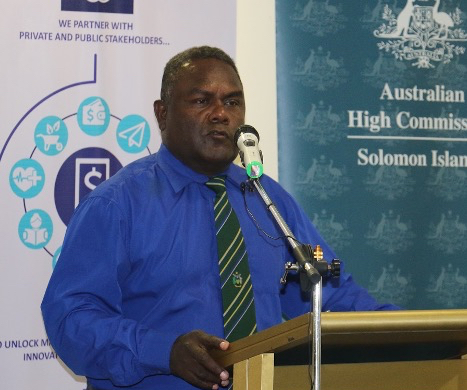The INCLUSIVE DIGITAL ECONOMY SCORECARD (IDES) for Solomon Islands was announced in Honiara Friday last week during the launching of the Solomon Islands National Financial Inclusion Strategy 3 (2021-2025).
The Inclusive Digital Economy Scorecard (IDES) for Solomon Islands is a Policy tool to help government set priorities for Solomon Islands Digital Transformation. It also identifies key market constraints hindering the development of an inclusive digital economy and helps government set priorities with public and private stakeholders, to foster a Digital Economy that leaves NO ONE BEHIND.
Permanent Secretary of the Ministry of Communication and Aviation, Moses Virivolomo said the foundation for the Inclusive Digital Economy Scorecard is based on four main areas including Policy and Regulation, Infrastructure, Innovation and Skills.
A Digital economy refers to an economy that is based on digital computing technologies to conduct business through markets based on the internet and the World Wide Web.
According to Virivolomo, the best example of Digital Economy is the rise of digital platforms such as Amazon, Uber and Airbnb.
These companies connect market participants together in a virtual world through computers to reveal optimal prices and generate trust between strangers in new ways.
The digital economy has brought many new services, which were inconceivable before, such as online home deliveries for grocery to dating apps.
The mass production of data can help inform governments and charities about what is happening in the economy.
The MCA, according to Virivolomo sees this IDES as a status report where the Government can prioritize, improve & develop new policies to address gaps as per the IDES Scorecard. It will also help in the development of the new National Digital Economy Strategy for Solomon Islands, later develop, and introduce e-commerce in the country.
MCA has in fact started to roll out the implementation of the ICT Policy based on the implementation framework in the policy approved by Cabinet in 2017.
“We are working with partners to expand network infrastructure and increase coverage to our people. This will give opportunity to all in the community to participate and benefit from the digital transformation offerings,” Virivolomo said.
MCA is developing policies and legislation to address the issues including the SIMCARD registration now ready for Parliament and developing the Cyber Crime Legislation now ready for drafting stage.
The IDES when addressed by government in partnership with private sector will help aid the current National Development Strategy and at the same time bring us closer to achieving Sustainable Development Goals.
The MCA and government will also further advance the Communications sector policy on ACCESS and Connectivity by developing policies and providing environment for private to build infrastructure to expand coverage and thereby allow people to fully participate in the digital economy.
This will in turn bridge the Digital DIVIDE and same time address the “Last Mile” thereby leaving NO ONE BEHIND.
ENDS///
Source: GCU


